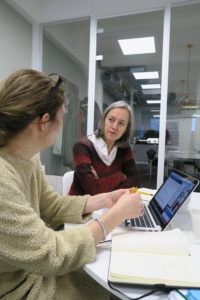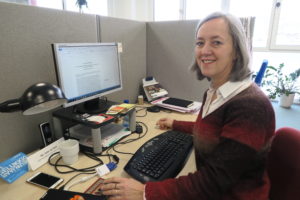Author: Olesya Kravchuk, AFEW International
AFEW International executive director Anke van Dam sums up the results of 2016 and gives introduction of AFEW activities for the upcoming year of 2017.
– How was the year of 2016 for AFEW?
– 2016 was a good year for us. We started with two big projects. First one is the second phase of the project Bridging the Gaps: health and rights for key populations (BtG). This second phase lasts until the end of 2020 and allows AFEW to continue with strengthening the capacity of local organisations in the field of harm reduction, client management, service provision and human rights. In the second phase of the BtG project, AFEW will explore the opportunities for the activities for labour migrants, rehabilitation and human rights violations in Eastern Europe and Central Asia (EECA) region. For the second project, AFEW received a grant from the Dutch Ministry of Foreign Affairs to engage Eastern Europe and Central Asia into AIDS2018 – the international AIDS conference to be held in Amsterdam in 2018. AIDS2018 gives us a chance to focus on the ongoing increase of new HIV cases, an increased number of multi-drug resistant TB cases and a high prevalence of Hepatitis C in the region. At AIDS2018 we will work hard to highlight those concerns, but also the achievements to mitigate the epidemics. One of the pillars of this engagement is strengthening the capacity of community based participatory research. We received more than 200 applications for a training which AFEW organised for 24 participants from 11 countries of EECA in November. The training is the part of a full package of activities to ensure that we have an increased participation of representatives of EECA by an increased number of abstracts and presentations. AFEW International expanded its team to six staff members. I am very pleased with my colleagues, and feel confident that we as team can build on a better future for the region.
– What were the greatest achievements and challenges for the organisation?
– I was very happy that Dutch Ministry of Foreign Affairs granted us the project AIDS2018. For me, this is the evidence that we are recognized as a leading organisation in prevention, treatment and care of HIV, TB and viral hepatitis in Eastern Europe and Central Asia. The increase of our annual budget in 2016 gave us the possibility to expand the team and therefore our contributions to projects, conferences, meetings etc. This leads to AFEW being seen as an important player in the HIV/AIDS, sexual and reproductive health field for EECA. The challenge remains to get sufficient attention and awareness for the groups that we work for: the key populations at risk for HIV, TB and viral hepatitis. People who use drugs, sex workers, LGBTI and prisoners are the ones who are still discriminated and have the least access to the health services. Budgets for these groups are small, and there is still little acknowledgement of their needs from an individual and public health perspective. AFEW will continue working hard to advocate for their rights to health, and to ensure their access to health services. Furthermore, there is still little awareness about the HIV prevalence in Eastern Europe. I hope to be able to change that with our activities for AIDS2018.
– What new things or big changes that happened in 2016 for AFEW?
– In 2016, AFEW expanded its profile of capacity building organisation. We also offered capacity strengthening in community based research. I am proud of our e-learning modules on this topic. Our members of the AFEW network are developing themselves with specific specialisations. AFEW-Ukraine is building up a lot of expertise around young drug users; AFEW-Kyrgyzstan strengthens the capacity of key populations with regards to advocacy and active involvement in governmental bodies; AFEW-Tajikistan increases access to testing and treatment, they managed to get a licence for community based counselling and testing for HIV; AFEW-Kazakhstan is expanding its expertise on prison health. A big change of 2016 was the move to our new office. Now we have working space with a beautiful view on the river IJ in Amsterdam.
 – What are the plans for the organisation for 2017?
– What are the plans for the organisation for 2017?
– We changed our name into AFEW International, and we will no longer spell out AFEW. The reason behind this change is that we do much more than AIDS and HIV, however AFEW as a brand is well known. That is why we keep it as AFEW. A new logo will be presented soon. We have developed a new strategic plan 2017 – 2019, and it is the basis of our work in the coming years. We prepared a communication strategy that gives us guidance to promote AFEW and its work. 2017 must be the year when AFEW leaves its modesty behind, and becomes visible as the leader for the region. The preparations for AIDS2018 will take a lot of our energy. Many activities are planned to bring many representatives of governments, civil society, universities and other institutions to Amsterdam in 2018. I am really excited about the cultural fund that we have established. Cultural initiatives that address stigma and discrimination will be financially supported to present before and during the international AIDS conference. On March 28, we will organise ‘Culture Cures and Kills II’ – a symposium for students of all kind of studies about the challenges and successes of the fight against HIV, TB and viral hepatitis in EECA. This symposium will raise awareness about the diseases in this region among the younger generation, the upcoming young professionals. I hope that many get interested and want to find a job in this field and in EECA. Furthermore, after three years of being a network we, all AFEW members, will evaluate the network construction and discuss how we want to work together in the future. All members have developed and strategized their activities. How does this fit in the bigger picture of AFEW? The aim is a better understanding and added value to the network. I am looking forward to an exciting year!




